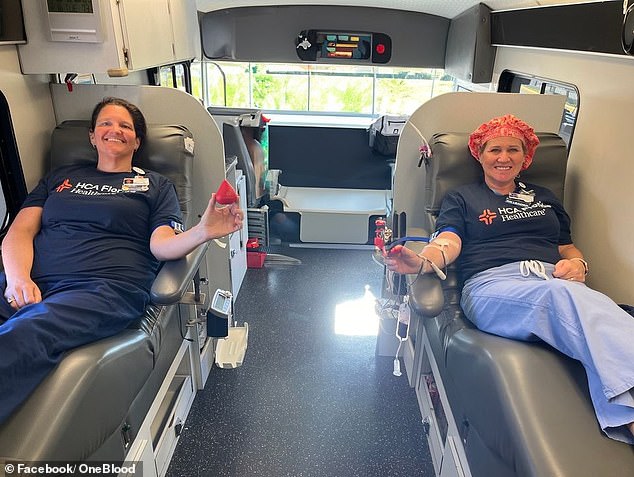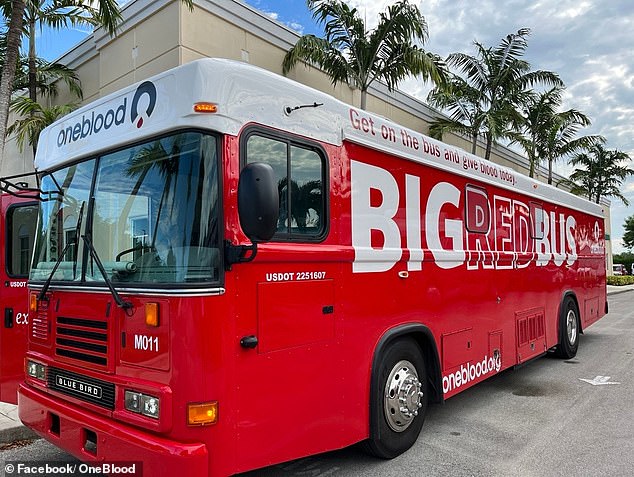A major blood donation organization has been the victim of a cyberattack, putting at risk the lives of 43,000 Americans who need life-saving blood every day.
OneBlood, a nonprofit organization, serves hundreds of hospitals in the southeastern United States, and the attack on its computers could disrupt services to the facilities.
Sources familiar with the situation said that The incident is being investigated as a possible ransomware attack.
OneBlood said it is “working closely with cybersecurity specialists, as well as federal, state and local agencies as part of its comprehensive response to the situation.”
The charity said it continues to collect, test and distribute blood but is “operating at a significantly reduced capacity” and is urgently appealing for donors.
OneBlood describes itself as “a nonprofit community asset responsible for providing safe, available and affordable blood.”
The outage is affecting OneBlood’s ability to ship “blood products” to hospitals in Florida, according to a notice sent to healthcare providers by the Health Information Sharing and Analysis Center, a cyber threat exchange group, and reviewed by CNN.
As a result, the organization has been manually labeling blood products.
Susan Forbes, Senior Vice President of Corporate Communications and Public Relations at OneBlood, saying In a statement, OneBlood takes the security of its network very seriously. Our team reacted quickly to assess our systems and began an investigation to confirm the full nature and scope of the incident.
‘Our comprehensive response efforts continue and we are working diligently to restore full functionality of our systems as quickly as possible.’
He added: “We have implemented manual processes and procedures to continue operating. Manual processes take much longer to complete and affect inventory availability.
“In an effort to further manage blood supply, we have asked the more than 250 hospitals we serve to activate their critical blood shortage protocols and remain in that state for the time being.”
The cyberattack comes on the heels of a global Microsoft service outage earlier this month, which left hospitals and healthcare providers without access to their electronic medical records and forced them to revert to paper records.
OneBlood supplies blood and blood products to 355 hospitals in Florida, Alabama, Virginia, Georgia and the Carolinas.
It has collection centers in Florida, Georgia and the Carolinas.
The organization said it has distributed 1 million donations across the United States and employs more than 2,500 people.
Earlier this year, the U.S. emergency blood supply reached a critically low level, prompting the country’s largest blood supplier to issue a “life-or-death” blood shortage emergency.
The American Red Cross declared a nationwide blood shortage in January, saying the number of people donating through the organization had dropped 40 percent recently, hitting a 20-year low.
According to the Red Cross, in the United States, a person needs blood every two seconds to save their life and more than 40,000 units of blood products are needed every day.
In addition, more than 16 million blood products are transfused each year.
Following the service interruption, OneBlood launched an “urgent call for donors.”
“Blood supply cannot be taken for granted. The situation we are facing continues.
“If you are eligible to donate, we encourage you to schedule an appointment to donate as soon as possible,” Forbes said.

OneBlood said it has distributed 1 million donations across the United States and employs more than 2,500 people.

Above is a OneBlood map of the U.S. counties where the organization has donation centers in Florida, Georgia and the Carolinas.
People can donate whole blood or blood components, including red blood cells, which are usually donated to trauma patients, or platelets, which help blood clot and are used for cancer treatments and organ transplants.
A single car accident victim may need up to 100 units of blood, the Red Cross said, and the blood cannot be manufactured: it must come from a donor.
Microsoft’s global service outage earlier this month affected businesses and organizations across nearly every industry, from travel to healthcare to banking, and cost billions.
Although it was not believed to be a malicious attack, a software update from a cybersecurity firm called CrowdStrike caused hundreds of thousands of computers around the world to suddenly shut down.
In previous cases, when hospital and healthcare computer systems went down, patients told DailyMail.com they were denied drugs for blood clots, addiction and cancer or had to pay up to seven times the normal cost after insurance.
And in one case, a nine-month-old baby lost its life.
Experts at the Ponemon Institute, an independent research group that studies critical security issues, surveyed more than 600 healthcare facilities and found that mortality rates increased in a quarter of locations after a ransomware attack.

